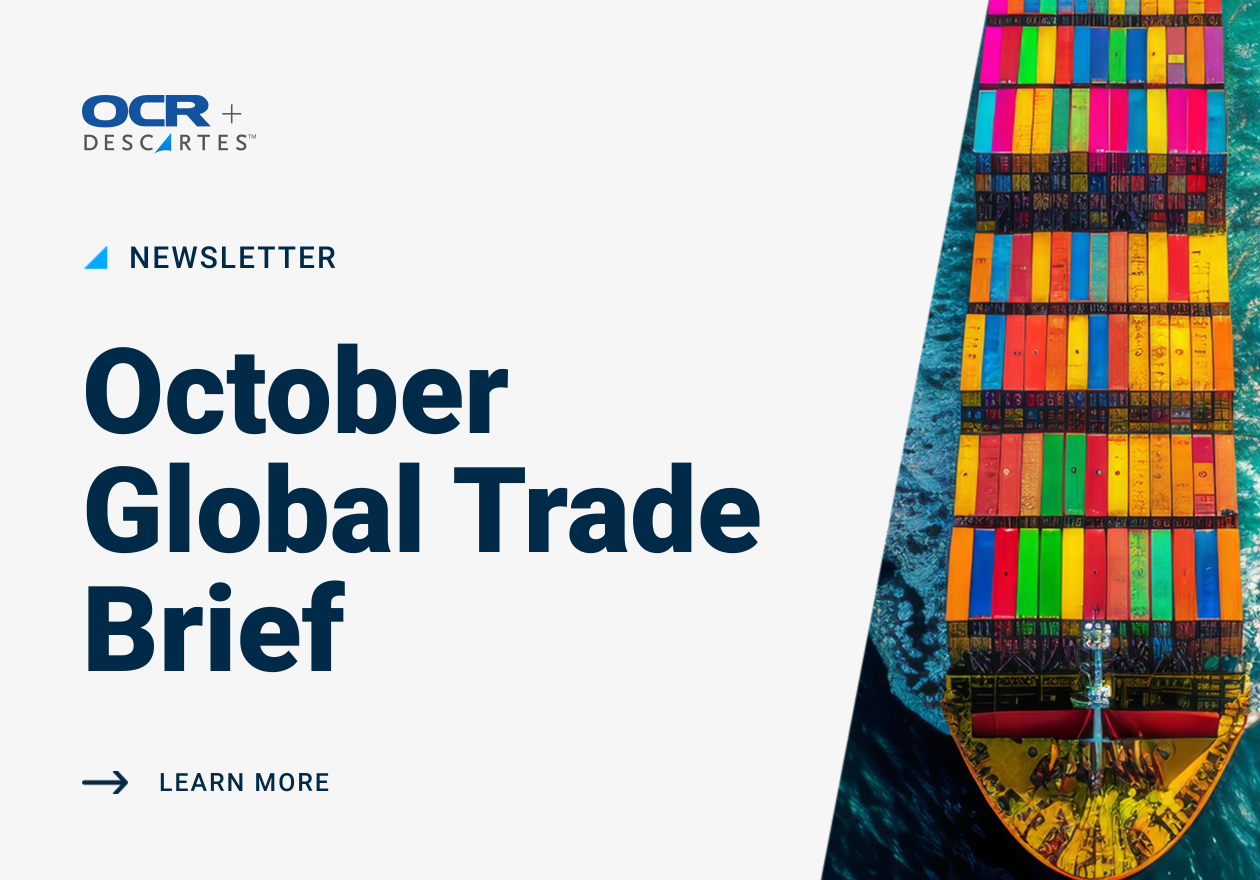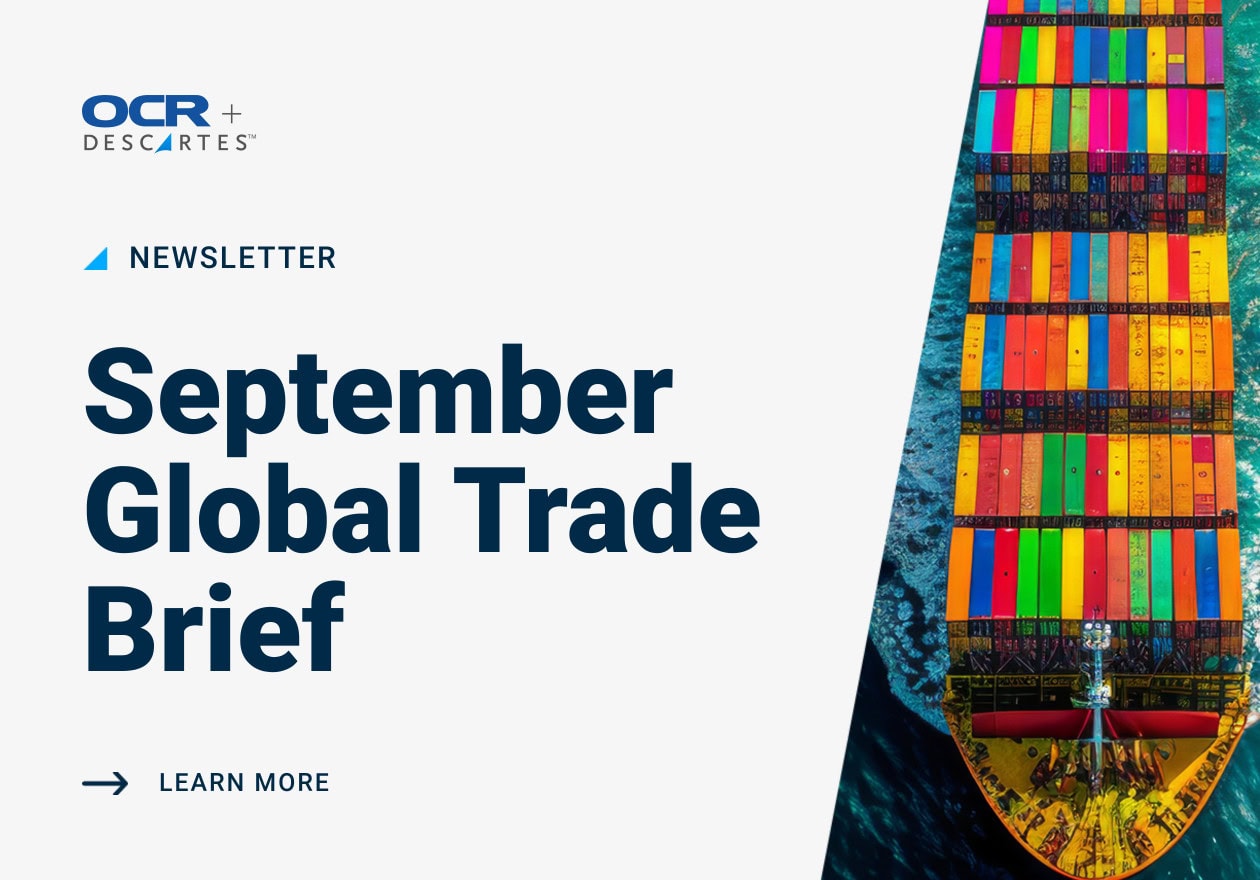CBP AMENDS THE DEFINITION IMPORTER SECURITY FILLING IMPORTER
Effective May 14, 2018 CBP adopts a proposed amendment to expand the definition of an Importer Security Filing (ISF) Importer, the party that is responsible for filing the ISF, for certain types of shipments. The amended definition is as follows:
(a) Importer Security Filing Importer. For purposes of this part, Importer Security Filing (ISF) Importer means the party causing goods to arrive within the limits of a port in the United States by vessel. For shipments other than foreign cargo remaining on board (FROB), the ISF Importer will be the goods’ owner, purchaser, consignee, or agent such as a licensed customs broker. For immediate exportation (IE) and transportation and exportation (T&E) in-bond shipments, and goods to be delivered to a Foreign Trade Zone (FTZ), the ISF Importer may also be the party filing the IE, T&E, or FTZ documentation. For FROB cargo, the ISF Importer will be the carrier or the non-vessel operating common carrier.
COUNTRY OF ORIGIN RULES FOR CERTAIN IMPORTS OF OIL COUNTRY TUBULAR GOODS (OCTG), SUBSTANTIAL TRANSFORMATION ANALYSIS VS. CIRCUMVENTION UNDER 19 U.S.C. § 1677J
[Bell Supply Co., LLC v. United States]
Facts:
Domestic Steel Companies) appealed to the U.S. Court of International Trade’s final judgment in favor of Bell Supply Company, LLC. The Trade Court affirmed the U.S. Department of Commerce’s determination that certain imported oil country tubular goods (OCTG), fabricated as unfinished OCTG in the People’s Republic of China and finished in other countries, were not subject to the antidumping and countervailing duty orders covering OCTG imported from China.
Analysis:
A substantial transformation occurs where, “as a result of manufacturing or processing steps . . . [,] the loses its identity and is transformed into a new product having a new name, character and use.”
To determine whether there has been a substantial transformation, Commerce looks to factors such as (1) the class or kind of merchandise; (2) the nature and sophistication of processing in the country of exportation; (3) the product properties, essential component of the merchandise, and intended end-use; (4) the cost of production/value added; and (5) level of investment.
- 1677j provides an anti-circumvention provision that prevents importers from avoiding AD or CVD orders by routing their merchandise through a third country. Section 1677j(b) applies to “merchandise imported into the United States [that] is of the same class or kind as any merchandise produced in a foreign country that is the subject of” an AD or CVD order but is assembled or completed in a third country not subject to the order.
To include such merchandise within the scope of an order, Commerce must determine that (1) “the process of assembly or completion in the foreign country . . . is minor or insignificant,” (2) the value added in the country subject to the AD and CVD order is a significant portion of the total value of the merchandise, and (3) “action is appropriate under this paragraph to prevent evasion of such order or finding.” § 1677j(b)(1)(C)–(E).
Decision:
The Trade Court affirmed Commerce’s determination that OCTG finished in third countries do not meet the requirements for circumvention under 19 U.S.C. § 1677j. It was concluded that the Trade Court improperly proscribed Commerce from using the substantial transformation analysis to determine the country of origin for imported OCTG.
We conclude that Commerce is entitled to use the substantial transformation analysis to determine country of origin before resorting to the circumvention inquiry. Where an imported article is “from” can be an inherently ambiguous question. Because a single article can be assembled from various components and undergo multiple finishing steps, Commerce must have some way to determine the country of origin during scope inquiries. To that end, “[t]he ‘substantial transformation’ rule provides a yardstick for determining whether the processes performed on merchandise in a country are of such significance as to require that the resulting merchandise be considered the product of the country in which the transformation occurred. Accordingly, even though the imported OCTG was finished in Indonesia, it can still be considered “from China” if the finishing process in Indonesia did not substantially transform the product. This inquiry into where imported articles are “from” necessarily precedes the circumvention inquiry. Circumvention can only occur if the articles are from a country not covered by the relevant AD or CVD orders.
GSP GOODS SUBJECT TO SECTION 201 MEASURES
GSP Goods Subject to Section 201 Measures (certain solar cells, solar panels, washing machines, and washing machine parts)
- Articles normally eligible for GSP duty preference that are subject to Section 201 duty and quota measures may not receive GSP duty preference, in accordance with 19 USC 2463(b)(2).
- On imports subject to Section 201 measures, importers should pay the normal trade relations (column 1) duty rates and not submit the GSP Special Program Indicator (SPI) “A”.
- Currently, imports of certain solar cells and panels from Philippines and certain solar cells, solar panels, washing machines, and washing machine parts from Thailand are the only GSP eligible goods that are subject to Section 201 measures. Accordingly, these articles may not receive GSP duty preferences.
- If Section 201 duties and GSP are on the same entry lines, then no GSP refund will be issued for imports for the lapse period since 19 USC 2463(b)(2) precludes GSP program benefits accruing to Section 201 goods.
CASE STUDIES
WEIMING ZHANG, A.K.A. JOHN ZHANG AND SEASIA ENTERPRISES (USA), INC. AGREED TO PAY A CIVIL PENALTY OF $100,000 FOR COMMITTING VIOLATIONS OF THE EAR
Facts:
Zhang/Seasia obtained electronic equipment from U.S. manufacturers, in what Zhang/Seasia made to appear to the U.S. manufacturers as domestic transactions. After Zhang/Seasia received the equipment at Seasia’s address in Huntington, New York, they exported the items while taking various additional actions designed to avoid export control scrutiny and detection by U.S. law enforcement, including, for example, concealing the type of equipment involved, its value, and/or ultimate destination. Zhang/Seasia used packaging that they deliberately re-labeled to identify falsely the items inside as, for example, low-value computer motherboards, which would not have required a BIS license to export to China.
In addition, on at least one occasion, Zhang/Seasia did not export the equipment directly to China, but instead transshipped it to China via Hong Kong, while falsely stating or causing to be stated on export transaction documents that Hong Kong was the ultimate destination. Zhang/Seasia used Beijing Onsky Technologies, a.k.a. Beijing Lingtian, a Hong Kong company that, like Seasia, Zhang owned and controlled, to facilitate the transshipment of the equipment to China after it arrived in Hong Kong from the United States.
Conclusion:
John Zhang and Seasia Enterprises (USA), Inc. jointly and severally agreed to pay a civil penalty of $100,000 ($50,000 payable within 30 days and the payment of the remaining $50,000 suspended for five years and thereafter waived if the parties commit no further violations of the Order or the EAR) and denial of their export privileges for five years (suspended for a probationary period of five years and thereafter waived if the parties commit no further violations of the Order or the EAR) to settle charges that they committed one violation of EAR § 764.2(d) (Conspiracy to export items controlled for national security reasons from the United States to China without the required BIS licenses).
FEDERAL EXPRESS CORPORATION AGREED TO PAY A CIVIL PENALTY OF $500,000 FOR COMMITTING VIOLATIONS OF THE EAR
Facts:
BIS alleged that on fifty-three occasions between on or about July 1, 2011, and on or about January 19, 2012, FedEx caused, aided or abetted acts prohibited by the Regulations when it facilitated the export of civil aircraft parts and equipment used for electron microscope manufacturing, items subject to the Regulations and classified under Export Control Classification Number (ECCN) 9A991 or 7A994 and controlled for Anti-Terrorism (“AT”) reasons, or designated as EAR99, and valued in total at approximately $58,091, from the United States to Aerotechnic France SAS (“Aerotechnic”) in France, or to the Pakistan Institute for Nuclear Science and Technology (“PINSTECH”) in Pakistan, without the required BIS licenses.
Conclusion:
Federal Express Corporation d/b/a FedEx Express agreed to pay a civil penalty of $500,000 and complete external audits of its export controls compliance program cover FedEx fiscal years 2017-2020 to settle charges that it committed 53 violations of EAR § 764.2 (Causing, aiding, or abetting exports to entities on the Entity List without the required licenses).
FLIR SYSTEMS, INC., AGREES TO $30 MILLION CIVIL PENALTY AND OTHER MEASURES TO SETTLE ITAR VIOLATIONS
The U.S. Department of State’s Directorate of Defense Trade Controls (DDTC) has entered into a Consent Agreement with FLIR Systems, Inc., to settle charges that it committed over 300 violations of the ITAR, including unauthorized export of defense articles, to include technical data; the unauthorized provision of defense services to various countries, including proscribed destinations; violation of the terms and conditions or other limitations of license authorizations; and failure to provide accurate and complete reporting pursuant to Part 130 of the ITAR involving sensitive thermal imaging systems. FLIR Systems agreed to pay a $30 million civil penalty ($15 million of which may be suspended if it implements the remedial compliance measures set forth in the Consent Agreement) and, among other measures, the appointment of a Special Compliance Official/Internal Special Compliance Official for four years.
UNITED STATES: SANCTIONS ON IRAN
The Treasury Department and State Department will begin the process of implementing 90-day and 180-day wind-down periods for activities involving Iran. To effectuate the wind-down periods, the State Department issued certain statutory sanctions waivers to provide for a wind-down period and plans to take appropriate action to keep such waivers in place for the duration of the relevant wind-down periods. As soon as is administratively feasible, Treasury’s Office of Foreign Assets Control (OFAC) expects to revoke, or amend, as appropriate, general and specific licenses and to issue new authorizations to allow the wind-down of transactions and activities that were authorized pursuant to the revoked or amended general and specific licenses. At the end of the 90-day and 180-day wind-down periods, the applicable sanctions will come back into full effect.
BIS MAKES CHANGES TO SNAP-R LICENSING SYSTEM
Effective May 14, 2018, the following updates have been made to the SNAP-R Licensing system by U.S. Department of Commerce’s Bureau of Industry and Security (BIS):
- Login Help Screen to provide assistance for the login process.
- New “Contact Person” field in the “List Work Items” page o allow you to see the contact person for each work item owned by your company (once the owner has shared the work item with you).
- Telephone and fax number formats (Blocks 2, 15, 16, 17, 18, 19, and 20). BIS changed the telephone number field format in all blocks to accommodate international telephone numbers and telephone extension numbers. For the SNAP-R Contact field, this change now allows 18 characters; for other SNAP-R parties (Blocks 15, 16, 17, 18, 19, and 20), the Phone and Fax text fields now allow 30 characters.
- Increased character limits in Party/Entity names and addresses (Blocks 14-20) from 35 to 80; in Specific End User (Block 21) from 250 to 1,140; in Technical Description (Block 21) from 250 to 1,440; and Additional Information (Block 24) from 250 to 1,440.



